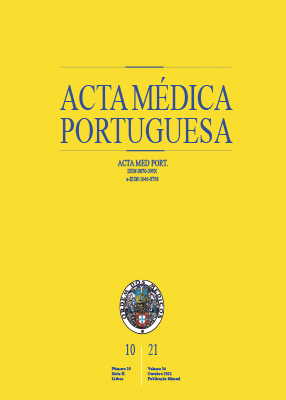Management of Psoriasis by Family Physicians: Referral Algorithm and Shared Management with Dermatology
DOI:
https://doi.org/10.20344/amp.13159Keywords:
Dermatology, Family Medicine, General Practice, Psoriasis/therapy, Referral and ConsultationAbstract
Introduction: The implementation of models capable of improving referral quality, limiting the growth of waiting lists in hospitals, and ensuring the best possible treatment and follow-up of the psoriatic patient is of the utmost importance.
Material and Methods: A panel of Family Physicians and Dermatologists discussed and created a simple and effective algorithm of referral for patients with psoriasis.
Results: The proposed algorithm starts when the Family Physician suspects of psoriasis. In case of diagnostic doubt, the patient should be referred to Dermatology. In case of a confirmed diagnosis, the Family Physician should assess the patient’s severity and responder profile, evaluate comorbidities and assess the presence of psoriatic arthritis. If psoriasis is mild, topical treatments should be initiated, and if there is no clinical improvement or worsening of the disease, the patient should be referred to Dermatology. If psoriasis is moderate to severe, is located in high impact locations, or in pediatric age, the patient should be referred to Dermatology. In order to enable shared management in terms of follow-up and treatment of these patients, it is critical that the Family Physician has the necessary knowledge regarding the systemic treatments used in psoriasis and their side effects.
Discussion and Conclusion: Only a shared management of the psoriatic patient can allow for the best treatment and follow-up of these patients, a more rational use of available medical resources, thus giving the patient the best possible quality of life.
Downloads
Downloads
Published
How to Cite
Issue
Section
License
All the articles published in the AMP are open access and comply with the requirements of funding agencies or academic institutions. The AMP is governed by the terms of the Creative Commons ‘Attribution – Non-Commercial Use - (CC-BY-NC)’ license, regarding the use by third parties.
It is the author’s responsibility to obtain approval for the reproduction of figures, tables, etc. from other publications.
Upon acceptance of an article for publication, the authors will be asked to complete the ICMJE “Copyright Liability and Copyright Sharing Statement “(http://www.actamedicaportuguesa.com/info/AMP-NormasPublicacao.pdf) and the “Declaration of Potential Conflicts of Interest” (http:// www.icmje.org/conflicts-of-interest). An e-mail will be sent to the corresponding author to acknowledge receipt of the manuscript.
After publication, the authors are authorised to make their articles available in repositories of their institutions of origin, as long as they always mention where they were published and according to the Creative Commons license.









